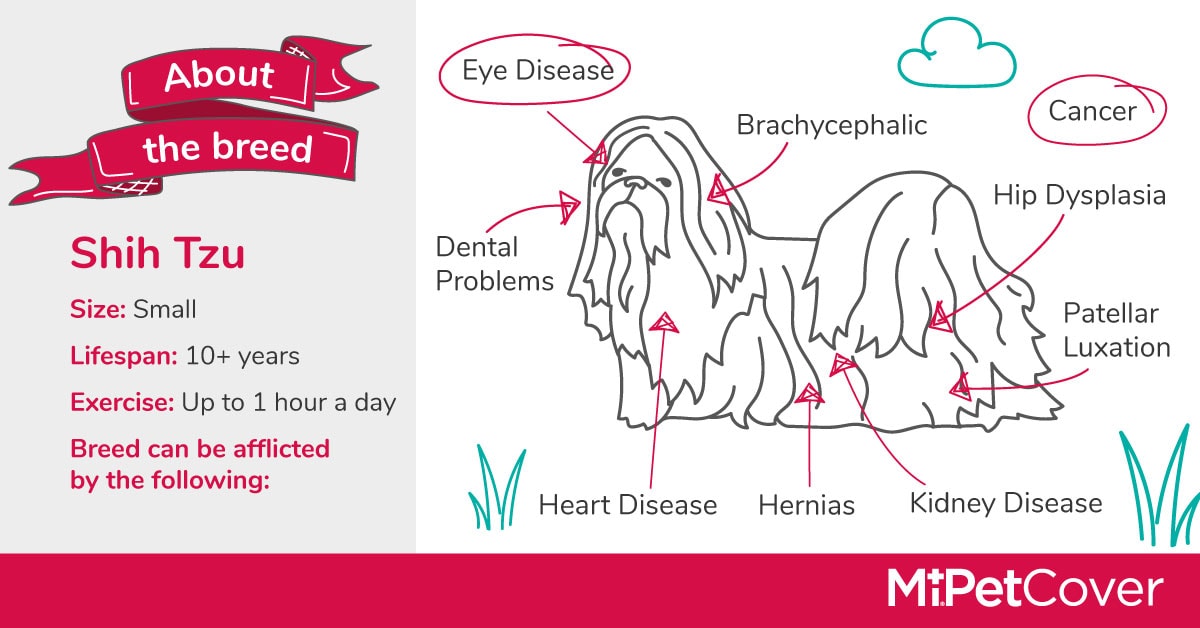The Shih Tzu: A Loyal and Affectionate Dog
A loyal and affectionate dog, the Shih Tzu is an ancient breed that originated in Tibet. They are much-loved for their confident and self-assured personalities. They are alert and suspicious of strangers, making them excellent watch dogs.

While they are by no means athletes, they still enjoy having a couple of 30 minute leisurely walks each day. This way, they can stretch their legs and have fun exploring their environment. For them, the fun is more in taking in the sights and scents than travelling a long distance.
Their long silky coat is high maintenance and requires daily grooming to prevent tangles and mats. Many owners choose to keep their fur trimmed short, to make life easier for everyone. As their beard and moustache can attract food when eating, it helps to bathe and dry their face after each meal.
These small dogs are brachycephalic, meaning they have a snub-nose and can suffer with breathing issues. Their eyes are bulbous and they have ears which hang down. Breed members will not measure more than 30cm and should weigh from 4.5kg to 8.5kg. Their coat comes in a range of colours including white, brown, red and liver.
Health Issues in Shih Tzus
Though the Shih Tzu can live well into its teens, there are a range of medical issues that they can suffer from.

These include:
- Intervertebral Disc Disease. The long back of the Shih Tzu means it is prone to spinal cord injuries. The spinal cord becomes compressed when the cushioning discs between the back bones bulge out. Signs can be mild or severe, ranging from a mild discomfort or limp to complete paralysis. It is important a vet assesses your dog ASAP if they start to show signs and they may wish to perform diagnostic imaging such as a CT scan. For those with more severe disease, surgery may be required. This is a specialised surgery that will cost several thousand pounds.
- Mitral Valve Disease (MVD). This heart disease tends to affect middle-aged to older Shih Tzus and can cause signs including an ongoing cough, reduced ability to exercise and panting. Your vet may detect a heart murmur and will suggest a chest x-ray and/or heart scan is done, in order to get a diagnosis. Those with MVD will typically benefit from ongoing medication, to slow the progression of their disease.
- Dental Disease. The short skull of the Shih Tzu means many suffer with dental overcrowding. This predisposes them to periodontal disease as food can get stuck between the teeth and plaque will build up. It is important that owners brush their dog’s teeth on a daily basis. Many Shih Tzus will also need dental cleanings under anaesthetic several times during their lifetime.
- Corneal Ulcers and ‘Dry Eye’. Due to the shape of the Shih Tzu’s eyes, they are more prone to injuries and eye scratches or ulcers. These can be detected by staining the eye with Fluorescein. For some dogs, they will have an underlying issue known as ‘Dry Eye’ that can cause repeated ulcers and infections. These dogs need daily lubricant and immunosuppressant drops to prevent the eyes from getting too dry. The cost of this medicine and ongoing monitoring will add up over the course of the pet’s lifetime.
- Brachycephalic Upper Airway Syndrome. The short skull of the Shih Tzu causes a range of problems and means there isn’t quite enough space for all of their soft tissue anatomy. Issues including small nostrils and elongated soft palates can lead to snoring, noisy breathing and breathing difficulties. These dogs are also less able to cope in warm weather. It is sensible to keep Shih Tzus slim and to use a body harness rather than neck collar. Some dogs benefit from corrective surgery, which is usually performed at a referral centre and is notoriously expensive.
The Shih Tzu is a popular breed all around the world thanks to its outgoing personality and the strong bond they form with their owners. Sadly, there are quite a few health conditions that can affect the Shih Tzu.
Shih Tzu Insurance
As with any pedigree or cross-breed, it’s always a good idea to have a dog insurance policy in place to help with unexpected vet fees.
If you’re introducing a Shih Tzu puppy to your home, why not take a look at our four weeks’ free WalkawayCover* created especially for new pups aged 8 weeks to one year?
*Puppy must be between 8 weeks and 1 year old and is subject to a CVS health check. WalkawayCover covers illness and accidents instantly. Not all breeds of dog are eligible.
You might also be interested in…
Get a quote in minutes…

Existing customers
Call now on 0808 164 7999
to discuss your policy with us.
Monday - Friday: 08:00 - 20:00 Saturday: 09:00 - 14:00





 Back
Back
